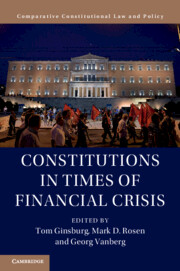Book contents
- Constitutions in Times of Financial Crisis
- Constitutions in Times of Financial Crisis
- Copyright page
- Contents
- Contributors
- Foreword
- I The Role of Constitutions in Dealing with Crises
- II Courts and Crises
- III Supranational Governance and Crisis
- IV Implementing Austerity
- V The Effect of Crises on Constitutions
- Index
I - The Role of Constitutions in Dealing with Crises
Published online by Cambridge University Press: 08 June 2019
- Constitutions in Times of Financial Crisis
- Constitutions in Times of Financial Crisis
- Copyright page
- Contents
- Contributors
- Foreword
- I The Role of Constitutions in Dealing with Crises
- II Courts and Crises
- III Supranational Governance and Crisis
- IV Implementing Austerity
- V The Effect of Crises on Constitutions
- Index
Summary
The constitutions of most liberal democracies contain provisions that constrain governmental action in relation to economic policy. Some provisions grant citizens rights: For example, Americans enjoy a right under the US constitution’s Contract Clause, prohibiting states from impairing the obligation of contracts. Most constitutions also provide individual rights protections against uncompensated and arbitrary taking of property. Structural provisions of constitutions also affect economic policy, sometimes by limiting government action directly, rather than through the claims of citizens. For example, balanced-budget rules constrain fiscal decision-making, as do legislative supermajorities required by some constitutions for financial decisions. Such structural provisions have spread in recent years, especially in response to the great recession of 2007 and 2008.
- Type
- Chapter
- Information
- Constitutions in Times of Financial Crisis , pp. 1 - 92Publisher: Cambridge University PressPrint publication year: 2019



